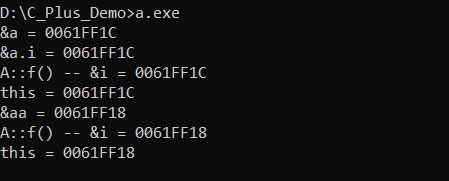C++ 成员变量
4. 成员变量
4.1 Fields, parameters, local variables
- All three kinds of variable are able to store a value that is appropriate to their defined type.
4.1.1 Fields
-
Fields are defined outside constructors and methods.
-
Fields are used to store data that persists throughout the life of an object. As such, they maintain the current state of an object. They have a lifetime that lasts as long as their object lasts.
-
Fields have class scope: their accessibility extends throughout the whole class, and so they can be used within any of the constructors or methods of the class in which they are defined.
-
a.h
#ifndef _A_H_
#define _A_H_
void f();
extern int global;
class A {
private:
int i;
public:
void f();
};
#endif
a.cpp
#include <iostream>
#include "a.h"
void A::f() {
// j 为本地变量,仅在 f() 中有效
int j = 10;
// i 为成员变量,在类 A 的所有函数中可以使用
// 在创建 A 类的对象后,成员变量才有效
i = 20;
std::cout << "i = " << i << ", j = " << j << std::endl;
}
int main()
{
A a;
a.f();
return 0;
}
4.1.2 本地变量(local variable)
-
Local variables are defined inside a method, have a scope limited to the method to which they belong.
-
深入理解
a.cpp
#include <iostream>
class A
{
public:
// 对变量 i 的声明
int i;
void f();
};
void A::f()
{
std::cout << "before i = " << i << std::endl;
i = 20;
std::cout << "after i = " << i << std::endl;
}
struct B
{
int i;
};
void f(struct B* p)
{
p->i = 20;
std::cout << "struct B: " << p->i << std::endl;
}
int main()
{
A a;
A aa;
B b;
a.i = 10;
std::cout << "before main i = " << a.i << std::endl;
// f 函数属于 类A,不是属于 对象a
// a.f() 是让 对象a 去做 类A的函数 f 中的动作
// 等同于 A::f(&a)
a.f();
std::cout << "after main i = " << a.i << std::endl;
std::cout << "==== aa ====" << std::endl;
aa.i = 100;
aa.f();
f(&b);
return 0;
}
4.2 Call functions in a class
- There is a relationship with the function be called and the variable calls it.
- The function itself knows it is doing something with the variable.
- 通过打印地址,深入理解
a.cpp - 以 32 位进行编译:
g++ -m32 a.cpp
#include <stdio.h>
class A
{
public:
// 对变量 i 的声明
int i;
void f();
};
void A::f()
{
i = 20;
// 输出 i 的地址
printf("A::f() -- &i = %p\n", &i);
// 打印 this 的地址
printf("this = %p\n", this);
}
struct B
{
int i;
};
void f(struct B* p)
{
p->i = 20;
}
int main()
{
A a;
A aa;
a.i = 10;
printf("&a = %p\n", &a);
printf("&a.i = %p\n", &(a.i));
a.f();
printf("&aa = %p\n", &aa);
aa.f();
return 0;
}
- 运行结果:

4.2.1 this: the hidden parameter
- this is a hidden parameter for all member functions, with the type of the class
a.cpp
// 定义函数 f()
void A::f() {
// 省略...
}
// 等同于
void A::f(A *p) {
// 省略...
}
- To call the function, you must specify a variable;
main.cpp
// 通过对象,调用函数 f()
A a;
a.f();
// 等同于
A::f(&a);
参考资料:




 浙公网安备 33010602011771号
浙公网安备 33010602011771号